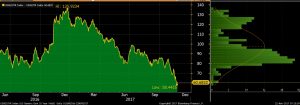Daily Comment (November 22, 2017)
by Bill O’Grady and Thomas Wash
[Posted: 9:30 AM EST] As a reminder, we will not publish the Daily Comment this Friday, November 24. Although financial markets are quiet, there was a good bit of news. Here’s what we are watching:
Yield curve flattening: Yesterday, the U.S. yield curve flattened to its lowest point since November 2007; as a result, there have been growing concerns of an impending economic slowdown. The yield curve is one of the most widely used financial indicators in determining the health of the U.S. economy. An upward sloping yield curve signals that the economy is in good shape, whereas a flattening yield curve signals a possible slowdown and a downward sloping yield curve signals a possible recession. Furthermore, a change in the yield curve does not necessarily signal a change in the economy but rather it could reflect current monetary policy. As the Fed raises short-term interest rates, the market adjusts long-term interest rates based on inflation expectations.
That being said, we believe the flattening of the yield curve is the result of a combination of the Fed raising short-term rates and falling inflation expectations. After the election, inflation fears rose, which led to a rise in long-term interest rates. Inflation expectations have fallen as post-election inflation fears proved to be unfounded.

The chart above shows the spread between the two-year and 10-year Treasuries from June 2016 to the present. After Trump won the presidency there was a spike in the spread between the two- and 10-year Treasuries, but it has seen a steady decline since. A flattening yield curve suggests the Fed should be cautious with rate hikes next year as its actions could lead to an inverted yield curve. This sentiment is mirrored by Chicago FRB President Charles Evans, who expressed his hesitancy last month for supporting rate hikes if inflation expectations do not pick up.
Mugabe out: After 37 years of rule in Zimbabwe, Robert Mugabe has formally resigned from office and will be replaced his former Vice President Emmerson Mnangagwa. Mugabe’s peaceful departure is a positive sign for the region as it paves the way for new elections next summer. The change of power was likely supported by China, which has stood by Mugabe since he came to power in 1980. It has been reported that China became increasingly skeptical of Mugabe as he grew more unpopular among members of his own party.
Tensions rising in North Korea: Yesterday, North Korea escalated tensions with South Korea and the U.S. Last week, a North Korean border guard chased and shot a defector in the demilitarized zone that separates the two Koreas; this incident was a violation of the ceasefire agreement between the two countries. In addition, North Korea has denounced the U.S. decision to re-designate the country as a state sponsor of terrorism. The increased provocation is not likely to lead to war anytime soon, but we will continue to monitor the situation.


